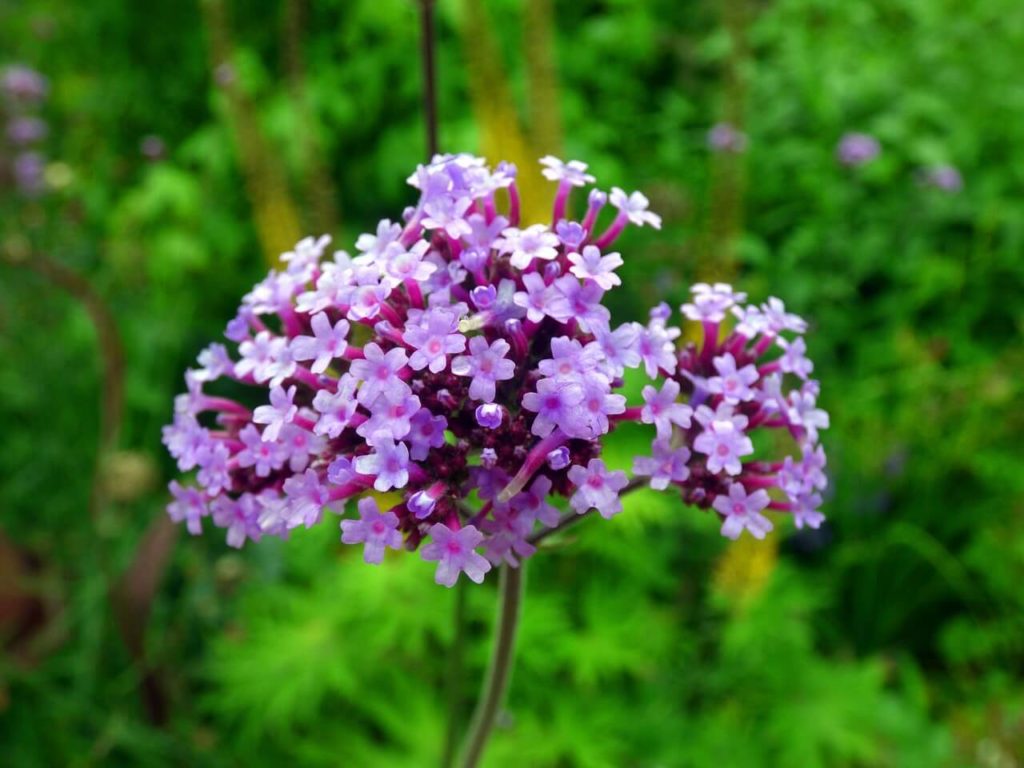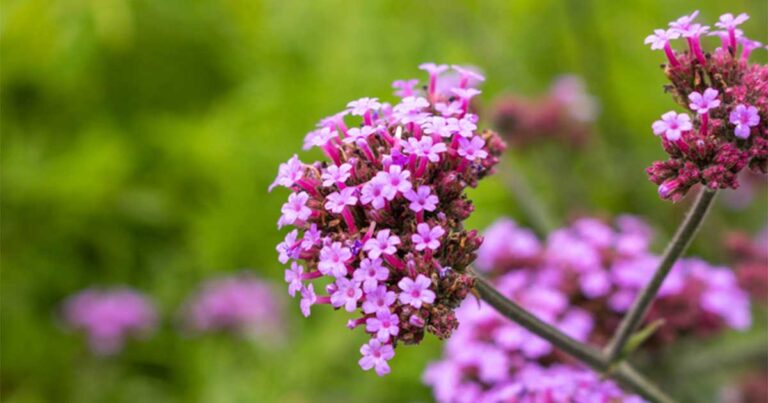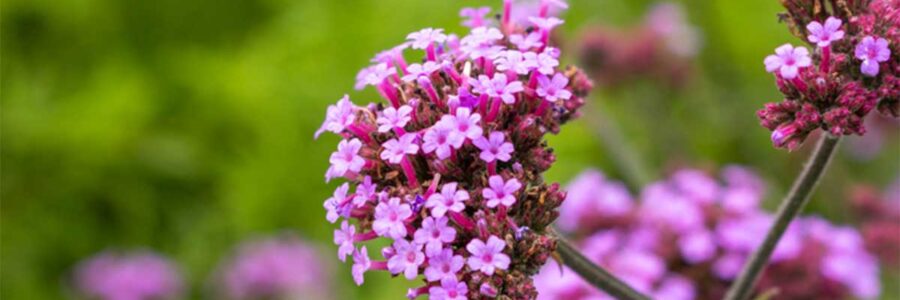Vervain has been valued for its healing properties and cultural meaning since ancient times. But what is it good for? Are there any scientific studies on the potential benefits of vervain? Can you grow it at home and use the herb whenever you need it?
Let’s dig into the matter one question at a time.
What is Vervain?

Vervain is a perennial herb with numerous medicinal properties. Scientifically known as Verbena officinalis, this plant has been traditionally used to fight infections, reduce fever, relieve stress, improve sleep, and soothe depression.
In this article, we’ll dive deep into the history and cultural value of the vervain herb, take a detailed look at its health benefits and check the available studies on the healing potential of Verbena officinalis. We’ll even go through how you can grow vervain at home!
The History of the Vervain Herb
Some plants are valued mostly for their healing potential, while others are better known for their major role in folk tales and ancient legends. Well, vervain is one of those rare herbs that have an equally rich history of medicinal use and cultural meaning!
History of Medicinal Use
Herbalists have been using vervain for thousands of years to treat all sorts of health conditions. Pliny the Elder (AD 23-79), a naturalist from the Ancient Roman Empire, described the following uses of the herb:(1)
- Supports lung and kidney health
- Helps fight dysentery (and diarrhea in general)
- Is effective against bladder stones
- Reduces fever in humans and cattle
- Heals chronic ulcers
In traditional Chinese medicine,(2) vervain has been used to heal cuts and wounds, fight skin infections, and treat menstrual disorders.
In the early 20th century, the popularity of vervain peaked thanks to English homeopath Edward Bach. He created 38 distinct blends of brandy and water with extremely low doses of medicinal herbs. The vervain flower remedy was used to treat over-excitement and agitation. Systematic reviews failed to confirm the effectiveness of Bach Flower Remedies, though.(3)
Modern scientific studies identified several bioactive phytochemicals in vervain. Each compound has its own health benefits, and we’ll get to that in a moment.
Vervain & Folklore
In ancient civilizations, people believed vervain was a plant that can channel supernatural forces and spiritual power. Even its scientific name, verbena, goes back to the Ancient Roman Empire, where this word referred exclusively to powerful sacrificial herbs.
In her book Legends and Lore of Texas Wildflowers, author Elizabeth Silverthorne shares a few interesting facts about the folk meaning of vervain in different cultures:(4)
- Ancient Egyptians believed vervain appeared from the tears of the goddess Isis, and thus considered the herb sacred
- In Christian folklore, it was believed that vervain was used to alleviate the bleeding from Christ’s wounds
- Priests in Greece, Rome, and Eastern civilizations used vervain to boost their divination powers
- In European folklore, witches allegedly used vervain in many of their potions and spells
- Funny enough, the common folk also believed that vervain was effective in keeping the same witches away—probably in a ”fight fire with fire” fashion
- Hungarian thieves believed that if a bit of vervain leaves were put in a small cut in the hand (and then the cut allowed to heal) the owner would acquire the magical power of opening any lock just by touching it!
- In many cultures, vervain was believed to be a herb that promotes joy and liveliness
But enough with the legends and tales!
What does modern science say about the healing power of the vervain herb?
What are the Benefits of Vervain?

Throughout the last years, studies have identified a wide range of phytochemicals in the vervain herb—and each of them comes with its own health benefits! Here are the most exciting discoveries so far:
1. Vervain fights inflammation and alleviates pain
Topical preparations with vervain extract have an anti-inflammatory action comparable in effectiveness to piroxicam, a conventional NSAID (non-steroidal anti-inflammatory drug). (5)
Additionally, the extract showed a mild analgesic (painkilling) effect. Most likely, the anti-inflammatory action of the vervain herb is based on its content of verbenalin, hastatoside, and verbascoside—phytochemicals almost unique to the verbena genus.(6)
2. Vervain shows promising results against a wide range of bacteria
Bacterial resistance to the most common conventional antibiotics is a major healthcare concern worldwide. In this context, vervain is showing amazing results so far:(7)
- Vervain stem is more effective against Staphylococcus aureus and Pseudomonas aeruginosa than Amoxicillin, a popular conventional antibiotic
- Vervain leaves show antibacterial activity against P. aeruginosa, S. aureus, and Citrobacter freundii
- Vervain roots are highly effective against P. aeruginosa, S. aureus, and Bacillus subtilis
All mentioned bacteria are extremely dangerous (especially in hospital environments), so it’s great to have a natural remedy like vervain.
3. Vervain promotes healthy sleep
Vervain is rich in two phytochemicals (verbenalin and hastatoside) that may improve quality of sleep. In animal studies, these compounds increased the time and depth of sleep 3-5 hours after administration.(8) Try drinking vervain tea 3 hours before going to bed to see if this herb works for your sleep.
4. Vervain may help in treating depression
The verbenalin and verbascoside phytochemicals in Verbena officinalis seem to have antidepressant-like action, at least in animal studies.(9) Most likely, this effect is based on the compounds’ interaction with serotonin, leucine, and norepinephrine transporters in the brain. Who knows, maybe vervain is, indeed, a plant that promotes merriness—just like ancient herbalists believed?
5. Vervain tea may be helpful against baby colic
A small study back from 1993 reported that a herbal tea with vervain, chamomile, licorice, fennel, and lemon balm was much more effective in eliminating baby colic than placebo. (10)
6. Vervain fights anxiety and has a mild sedative effect
Throughout the centuries, vervain has been widely used as a calming herb that may fight stress and agitation. As it turns out, scientific evidence speaks in favor of this approach! Animal studies reported that vervain reduces the frequency of epileptic seizures, reduces anxiety, and acts as a natural sedative.(11) In theory, this could make vervain useful for treating epilepsy, insomnia, and anxiety disorders. Alas, we’ll need to wait for some clinical trials to confirm that.
7. Vervain may promote gum health and fight gingivitis
Thanks to the herb’s powerful antibacterial action, vervain teas and decoctions are extremely beneficial for gum health. For example, a study from 2016 reported that two weeks of using a vervain decoction as a mouthwash daily (in addition to brushing and flossing) significantly reduced gum inflammation and oral plaque in patients with gingivitis.(12)
8. Vervain may have anti-tumor properties
Although it’s way too early to celebrate and recommend vervain as a universal anti-tumor herb, preliminary studies have reported exciting results. For instance, one animal study found that vervain was almost as effective as cisplatin (a common chemotherapy drug) in inhibiting tumor growth in rats. The effectiveness of the herb was as high as 38.78% compared to the 42.94% inhibition rate of cisplatin!(13)
9. Vervain protects the brain from Alzheimer’s disease and disturbances in blood flow
Although we don’t know for sure what causes Alzheimer’s disease, the beta-amyloid theory is currently the most popular. According to this theory, Alzheimer’s disease is caused by the formation of a pathological protein in the brain called beta-amyloid. Beta-amyloid deposits are toxic for the brain cells and may severely impair their function.(14)
A few laboratory studies reported that vervain extracts might protect the brain from neuronal loss in Alzheimer’s disease, so that’s one more reason to use this herb!(15) Additionally, verbenalin (one of the main active compounds of Verbena officinalis) can protect the brain from unstable blood flow by improving local blood circulation.(16)
10. Vervain may help in treating prostatitis
Animal studies reported that verbenalin is effective in reducing prostate inflammation and related unhealthy changes in the testes.(17) The bad news is that, in this study, verbenalin was injected directly into the gland, meaning that homemade vervain teas will probably be much less effective. Still, in matters of health, every little bit helps.
11. Vervain fights diarrhea
Another traditional use of vervain has been recently confirmed through scientific studies. The tannins and terpenoids found in the herb have a mild astringent action and help to reduce intestinal secretion during diarrhea.(18) Apparently, vervain roots are more effective than leaves in this matter.
How Does Vervain Work?
All the health benefits linked to vervain use are based on the properties of its phytochemicals.
- The iridoids hastatoside and verbenalin have anti-inflammatory, sleep-promoting, and anti-anxiety action(8)
- The flavonoids apigenin, kaempferol, and luteolin show sedative, antioxidative, and neuroprotective properties(11)
- The leaves and roots of vervain are rich in terpenoids that may help to balance intestinal function and alleviate diarrhea(18)
How to Consume Vervain
The two main ways to reap all the health benefits of vervain are by drinking vervain teas or decoctions or by applying topical preparations of the herb. The first approach is better for systemic action (like in cases of fever or bacterial infection) while vervain topicals are better for a localized effect (for example, to treat a wound or bruise).
Vervain Tea
To prepare vervain tea, just put 1-2 teaspoons of vervain in a cup and top the herb with boiling water. Allow the tea to steep for 5-7 minutes. Enjoy warm. Alternatively, you can steep 3-5 teaspoons of vervain in a teapot for even more tea!
Vervain tea is suitable for a mild health boost, but probably not strong enough to treat specific health conditions. If that’s what you need, consider trying a vervain decoction.
Vervain decoction
Vervain decoctions are somewhat stronger than vervain teas, and thus might be more effective in cases of acute health conditions (for example, during an infection). To prepare a vervain decoction, put about 2 oz (56 g) of vervain in a pot and top with about 33 oz (1 liter) of cold water. Bring the pot to a gentle boil and simmer for 20 to 40 minutes on low or medium heat. Let your decoction cool down before drinking.
Topical Application
To apply vervain topically, you’ll need a clean cloth or gauze bandage. Soak it in vervain decoction or a batch of strong vervain tea, squeeze out the excess liquid, then put the cloth or bandage where needed. Alternatively, you can just apply a bit of crushed fresh vervain directly to the inflamed area or wound.
Side Effects of Vervain
Vervain is fairly safe when consumed in moderate amounts, but there are several safety notes to remember.
- Avoid taking vervain during pregnancy. A few animal studies reported that flavonoids like apigenin and luteolin may be somewhat toxic for the developing baby.(19)
- If you have never tried vervain before, start slowly and check how your stomach reacts to the herb. Some people may experience mild indigestion before they get used to vervain.
Last but not least, remember it’s always a wise idea to talk with your physician before taking any remedy (even a natural one) for your current health issues.
Vervain vs. Blue Vervain
Vervain (Verbena officinalis) and blue vervain (Verbena hastata) are two different herbs with more or less similar properties. Vervain is native to the European region while blue vervain is a North American herb.
Although both plants are rich in the same iridoids, terpenoids, and flavonoids, keep in mind that the studies we mentioned in this guide were done specifically on Verbena officinalis, not its blue cousin.
How to Grow Vervain
Vervain is a fast-growing and fairly drought-resistant herb that grows best in sunny (but not too hot) conditions. To grow your own vervain, try this approach:
- Purchase vervain seeds from a trusted seller.
- Start by planting your vervain indoors. The average germination time is about 3-4 weeks, depending on temperature.
- Keep the soil well-drained at all times, and water a bit only when it’s fully dry.
- Prick your vervain seedlings into separate pots when they grow strong enough.
- If needed, plant out your vervain seedlings in early summer.
You can plant your vervain directly outdoors, but keep in mind that the germination time will likely be longer in this case. You’ll also have to watch out for local weeds that could overgrow your vervain before it matures.
References:
- https://en.wikisource.org/wiki/Natural_History_(Rackham,_Jones,_&_Eichholz)/Book_26
- https://www.ncbi.nlm.nih.gov/pmc/articles/PMC5338068/
- https://www.ncbi.nlm.nih.gov/pubmed/19470153
- https://books.google.com.ua/books?id=w_hKCayJzOoC&pg=PA185&lpg=PA185&dq=vervain+folk+legends&source=bl&ots=aYkbVjeD5E&sig=ACfU3U1T4d5aAHUCnq3CSJEGbhZm20kVZA&hl=en&sa=X&ved=2ahUKEwix9KrVisLlAhUttYsKHTpzBVEQ6AEwD3oECBEQAQ#v=onepage&q=vervain%20folk%20legends&f=false
- https://www.sciencedirect.com/science/article/pii/S0378874106001887?via=ihub
- https://www.ncbi.nlm.nih.gov/pubmed/10960904
- https://www.tandfonline.com/doi/full/10.1080/23312009.2017.1363342
- https://link.springer.com/article/10.1111/j.1479-8425.2009.00405.x
- https://journals.lww.com/pbj/Fulltext/2017/09000/Antidepressive_potential_of_aqueous_extract_of.89.aspx
- https://www.ncbi.nlm.nih.gov/pubmed/8463920?dopt=Abstract
- https://www.ncbi.nlm.nih.gov/pmc/articles/PMC5174135/
- https://www.ncbi.nlm.nih.gov/pubmed/26824082
- https://www.ncbi.nlm.nih.gov/pmc/articles/PMC3777594/
- https://www.ncbi.nlm.nih.gov/pmc/articles/PMC2813509/
- https://www.ncbi.nlm.nih.gov/pubmed/16406021
- https://www.ncbi.nlm.nih.gov/pmc/articles/PMC6117236/
- https://www.sciencedirect.com/science/article/pii/S1319562X15002478?via=ihub
- https://www.ncbi.nlm.nih.gov/pmc/articles/PMC6580719/


